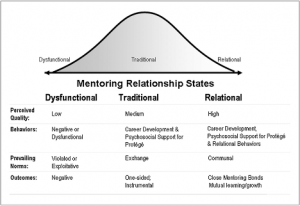5 DEVELOPMENTAL STAGES IN MENTORING RELATIONSHIPS
(Based on the work of Dr. Jennifer Park)
Every once in a while, it is good to review the relationships we have with our mentors and mentees. Do we have a particular type of mentoring style? What are some mentoring stages and their characteristics? Are we moving from one stage of mentoring to another?
Mentoring relationships are dynamic: They change over time and transform through various developmental stages of mentoring, which can be strengthened or weakened by the type of mentoring given/received in the relationship. Ideally, as mentors and mentees develop their relationships, they create communal norms that are especially “important in relational mentoring and developing close mentoring bonds” (Ragins & Verbos, 2007, p. 97).
Ragins and Verbos (2007) identified three basic relationship states: dysfunctional, traditional, and relational.
 (Adapted from Ragins and Verbos, 2007)
(Adapted from Ragins and Verbos, 2007)
Dysfunctional mentoring relationships may include negative experiences. The interactions of mentors and mentees may consist of abusiveness or non-responsiveness, not providing necessary guidance to the mentee. If you are experiencing such relationships, it is recommendable to talk to a person you trust to seek for assistance.
Typically, in traditional mentoring relationships, mentors provide one-on-one career support for their mentees. Mentors transfer their knowledge and experiences to the mentees so that mentees can develop. This mentoring is the most commonly observed type of mentoring relationship. For some, this relationship may be adequate that meets the goal of their mentoring relationships. However, the relationship can get deeper as mentors and mentees develop into a reciprocal relationship in which both learn from each other.
Relational mentoring is one that includes mutual learning and a communal, dyadic, and reciprocal relationship which extends beyond the traditional standpoint.
While the majority of mentoring relationships are traditional, only a small portion shows the frequency of relational mentoring. Traditional may work for some, but we may want to get to relational. It is recommended to check whether your relationship with your mentor/mentee leans more on the traditional or relational mentoring.
Which stage are we in our mentoring relationships? Would you like your relationship to move towards a relational mentoring? What are the steps to getting there?
The GMC guidelines offer practices and suggestions that can guide us towards relational mentoring. These are not static. They are emergent and what The GMC community learned and developed in its first seven years. As contexts and cultures change, these practices can and will change to meet the needs of mentors and mentees.

